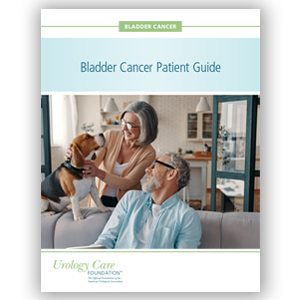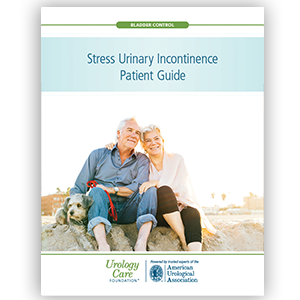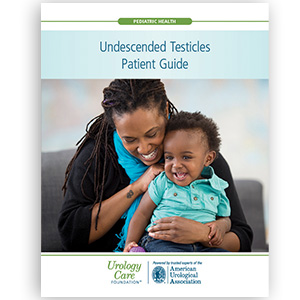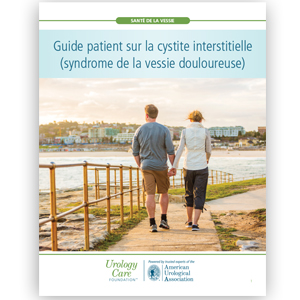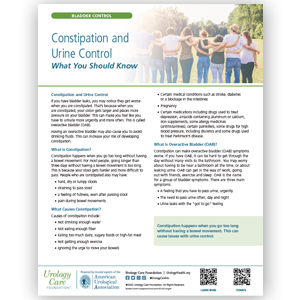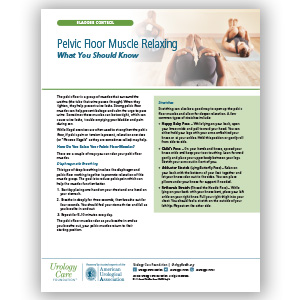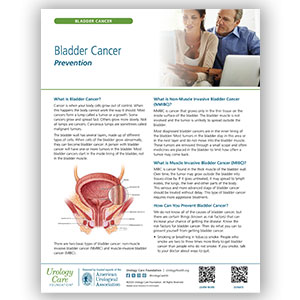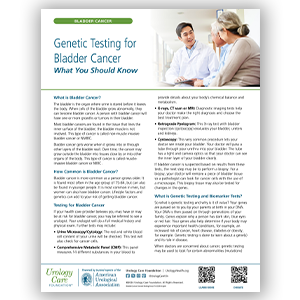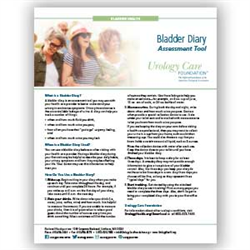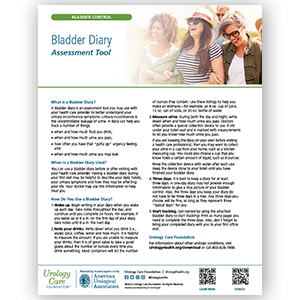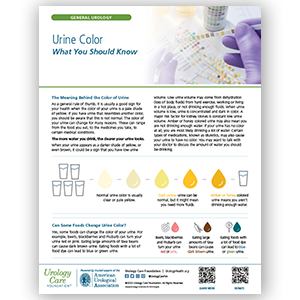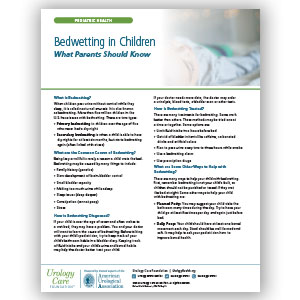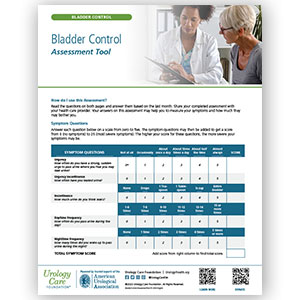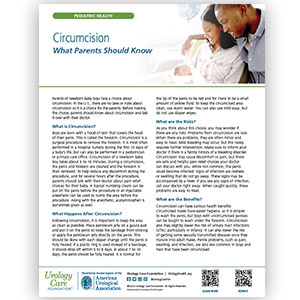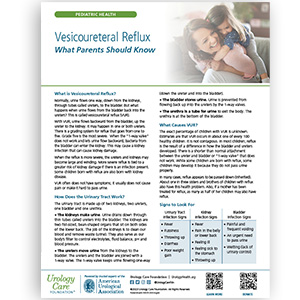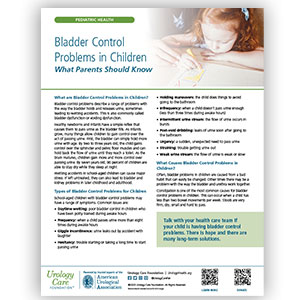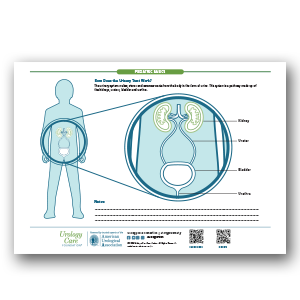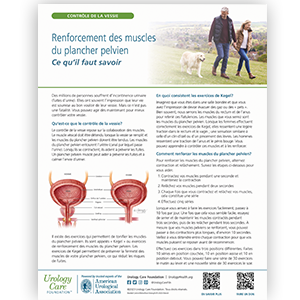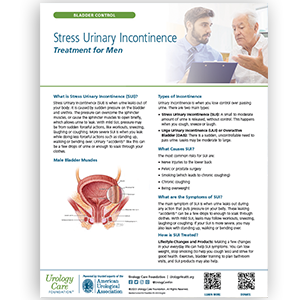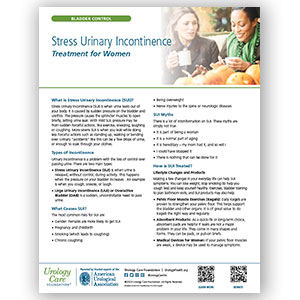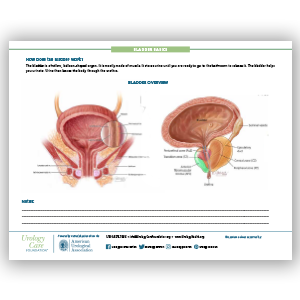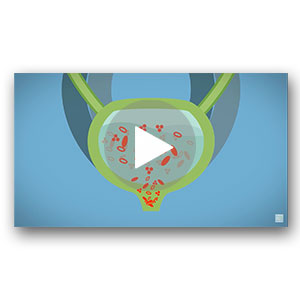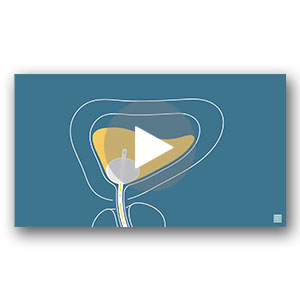Bladder Cancer Patient Guide
Guide with information about how to diagnose, treat and manage bladder cancer, including a patient perspective.… more
Living Healthy Cookbook with Information about Urologic Cancers
Part of managing cancer includes a healthy diet and lifestyle. This educational cookbook has recipes from celebrity chefs and is designed to help those affected by urologic cancers.… more
Living Healthy Cookbook with Information about Urologic Cancers
Part of managing cancer includes a healthy diet and lifestyle. This educational cookbook has recipes from celebrity chefs and is designed to help those affected by urologic cancers.… more
Stress Urinary Incontinence (SUI)
Download this patient resource on Stress Urinary Incontinence (SUI).… more
Guide patient sur la cystite interstitielle (syndrome de la vessie douloureuse)
La cystite interstitielle (CI), ou syndrome de la vessie douloureuse (SVD), est un problème de douleur vésicale chronique. Cela peut évoquer une infection de la vessie ou infection urinaire, mais ce n’en est pas une. Il s’agit d’une sensation d’inconfort et de pression dans la région de la vessie qui dure six semaines ou plus, sans infection ni autre cause évidente. (Patient Guide to Interstitial Cystitis (Painful Bladder Syndrome))… more
Hướng dẫn dành cho bệnh nhân ung thư bàng quang không xâm lấn cơ (UTBQ KXLC)
Ung thư bàng quang thường xuất phát từ lớp niêm mạc lót trong lòng bàng quang. (Non-Muscle Invasive Patient Guide)… more
HƯỚNG DẪN DÀNH CHO BỆNH NHÂN UNG THƯ BÀNG QUANG XÂM LẤN CƠ (UTBQ XLC)
Tài liệu hướng dẫn này sẽ nói cho bạn về UTBQ XLC và những gì bạn có thể làm để đối mặt với căn bệnh này. (Muscle Invasive Patient Guide)… more
UrologyHealth extra® – Bladder Cancer Special Issue
Order this special issue focusing on bladder cancer to be shipped free in the United States and includes information for patients and caregivers on the basics such as the stages of this cancer, symptoms, treatments, risk factors and how to learn more.… more
UrologyHealth extra® – Bladder Cancer Special Issue
Download this special issue focusing on bladder cancer that includes information for patients and caregivers on the basics such as the stages of this cancer, symptoms, treatments, risk factors and how to learn more.… more
Constipation and Urine Control - What You Should Know Fact Sheet
This fact sheet outlines what to know about constipation and urine control. Constipation happens when you go too long without having a bowel movement & this can cause issues with urine control. … more
Constipation and Urine Control: What You Should Know
Order this fact sheet that outlines what to know about constipation and urine control. Constipation happens when you go too long without having a bowel movement & this can cause issues with urine control. … more
Ureteropelvic Junction (UPJ) Obstruction - What Parents Should Know Fact Sheet
Learn about Ureteropelvic Junction (UPJ) Obstruction, its causes, symptoms and common treatments.… more
Bladder Exstrophy – What Parents Should Know Fact Sheet
Bladder exstrophy is a rare birth defect. On average, it occurs in about 1 out of every 50,000 live births. It is slightly more common in males than females. It is a condition where the bladder and parts around it form inside-out. … more
Bladder Cancer: What You Should Know
Learn more about the basics of bladder cancer including types, causes, symptoms, testing and treatment options. … more
Pelvic Floor Muscle Relaxing: What You Should Know
Strong pelvic floor muscles can help prevent leakage and calm the urge to pass urine. Sometimes these muscles can be too tight, which can cause urine leaks, trouble emptying your bladder and pain during sex.… more
Genetic Testing for Bladder Cancer – Talking to Your Doctor
Learn more about genetic testing for bladder cancer and how to prepare as a way to feel more ready to talk with your doctor.… more
Genetic Testing for Bladder Cancer - What You Should Know
A description about genetic testing for bladder cancer and how genetic test results may help patients make informed choices.… more
Bladder Diary Assessment Tool
Use this bladder diary assessment tool and share the results with your healthcare provider to get a better understanding of your urinary incontinence symptoms. … more
Bladder Diary Assessment Tool
Use this bladder diary assessment tool and share the results with your healthcare provider to get a better understanding of your urinary incontinence symptoms. … more
Bladder Prolapse - What You Should Know
An overview of bladder prolapse causes, symptoms, diagnosis and treatment options.… more
Urine Color - What You Should Know
A fact sheet about the meaning behind the color of urine for people of all ages to know when to drink more, what can change urine color and when to talk with a doctor about urine color.… more
Hypospadias – What Parents Should Know
A short summary of Hypospadias, including signs, diagnosis, treatments and questions to ask your child’s doctor.… more
Varicoceles - What You Should Know
Designed for teen boys and men to explain this condition, causes, treatments and address frequently asked questions.… more
Bedwetting in Children: What Parents Should Know Fact Sheet
Download this fact sheet.… more
Bladder Control Assessment Tool
This Bladder Control assessment tool may help to measure symptoms and quality of life related to passing urine.… more
Pelvic Floor Muscle Strength: What You Should Know
Download this fact sheet on how to perform Kegel exercises.… more
Overactive Bladder Assessment Tool
An assessment tool that allows patient to score symptoms and illustrates how they may be affecting their quality of life.… more
Overactive Bladder Diary
This Overactive Bladder Diary may help to record liquid intake, how often urine is passed and urine leakage to help you talk with your health care team.… more
Bladder Control Assessment Tool
This Bladder Control assessment tool may help to measure symptoms and quality of life related to passing urine. … more
Neurogenic Bladder - What You Should Know Fact Sheet
A fact sheet that helps patients to understand when nerve damage causes bladder problems and how to manage the condition.… more
Bladder Control Problem in Children - What Parents Should Know
Download this fact sheet.… more
Pediatric Urology Basics
The basics about urinary function in children with notes section to help patients, parents and health care teams.… more
L’énurésie chez l’enfant: Ce que les parents doivent savoir
Il est question d’énurésie nocturne lorsqu’un enfant urine involontairement pendant son sommeil. C’est ce qu’on appelle communément faire pipi au lit. Plus de cinq millions d’enfants aux États-Unis ont des problèmes d’énurésie. (Bedwetting – What Parents Should Know Fact Sheet)… more
Détente des muscles du plancher pelvien: Ce qu’il faut savoir
Un plancher pelvien musclé peut aider à prévenir les fuites et à calmer l’envie d’uriner. Parfois, ces muscles peuvent être trop tendus, ce qui peut entraîner des fuites urinaires, des difficultés à vider la vessie et des douleurs pendant les rapports sexuels. (Pelvic Floor Muscle Relaxing – What You Should Know Fact Sheet)… more
Renforcement des muscles du plancher pelvien: Ce qu’il faut savoir
Des millions de personnes souffrent d’incontinence urinaire (fuites d’urine). Elles ont souvent l’impression que leur vie est soumise au bon vouloir de leur vessie. Mais ce n’est pas une fatalité. Vous pouvez agir dès maintenant pour mieux contrôler votre vessie. (Pelvic Floor Muscle Strength – What You Should Know Fact Sheet)… more
Varicocèles: Ce qu’il faut savoir
Le terme varicocèle désigne une dilatation du groupe de veines situées à l’intérieur du scrotum (le sac qui contient les testicules) en raison d’une mauvaise circulation sanguine. (Varicoceles – What You Should Know Fact Sheet)… more
Bladder Basics
The basics about bladder function and bladder cancer with notes section to help patients and health care teams. … more
Bladder Cancer: Get the Facts
Did you know bladder cancer is the 10th most common cancer in the world? This patient education video from the Urology Care Foundation will tell you all of the facts you need about bladder cancer. … more
Genetic Testing for Bladder Cancer
You may have heard that genetics can play a role in a person developing cancer. As a result, genetic testing has emerged as a new way to identify a person’s risk for bladder cancer.… more
Bladder Cancer Treatment Series: Bladder Preservation
If you are a patient with muscle invasive bladder cancer, it is important to know your treatment choices. As part of your treatment, you may need to have some of your bladder removed. If this is the case, you should know your options for bladder preservation therapy.… more
Bladder Cancer Treatment: Intravesical Therapy
If you are a patient with non-muscle invasive bladder cancer, it is important to know your choices for treatment. Based on your diagnosis, your urologist may suggest intravesical therapy.… more
Bladder Cancer Treatment Series: Bladder Removal Surgery
Being told you have muscle-invasive bladder cancer can be very scary. However, your doctor and medical team are there to help. Your treatment choices will depend on how much your cancer has grown, and can involve bladder removal with chemotherapy or without chemotherapy.… more
Bladder Cancer Treatment Series: Urinary Diversion
If you are a patient with bladder cancer, it is important to know your choices for treatment.… more



